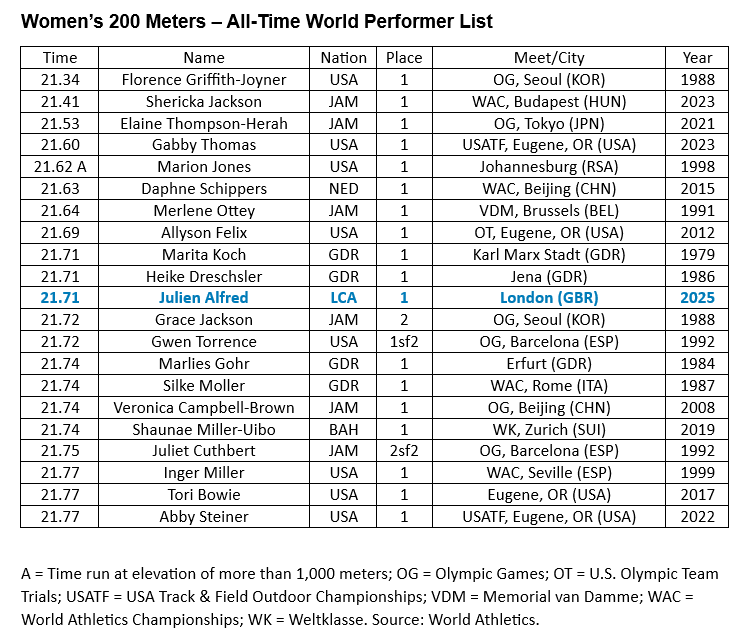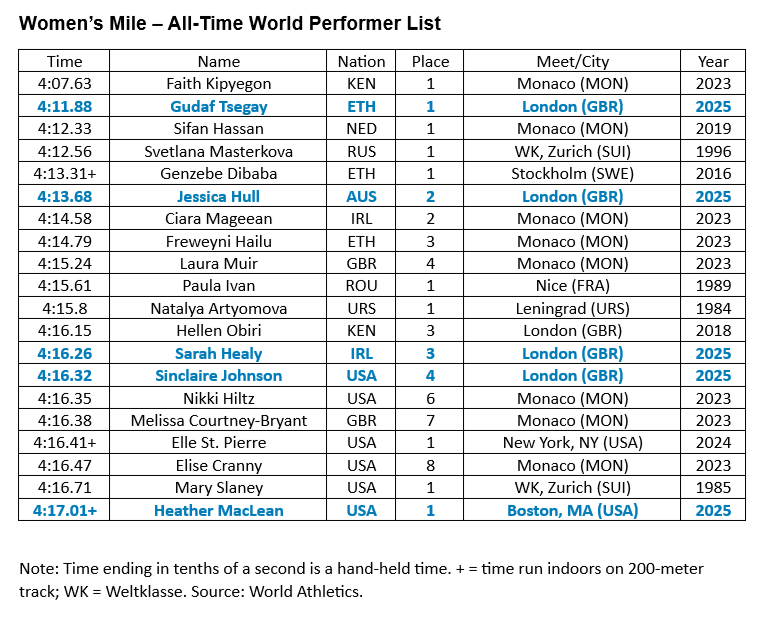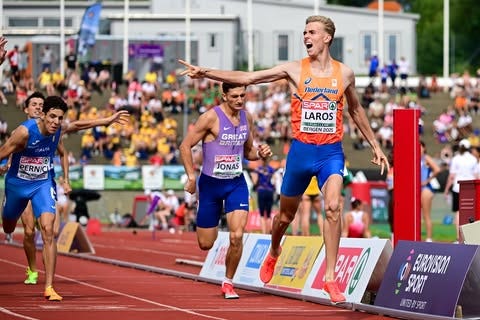Week in Review: Alfred looks primed for golden double in Tokyo
St. Lucian sprinter appears capable of winning 100 and 200 in World champs after runaway victory in longer race in London
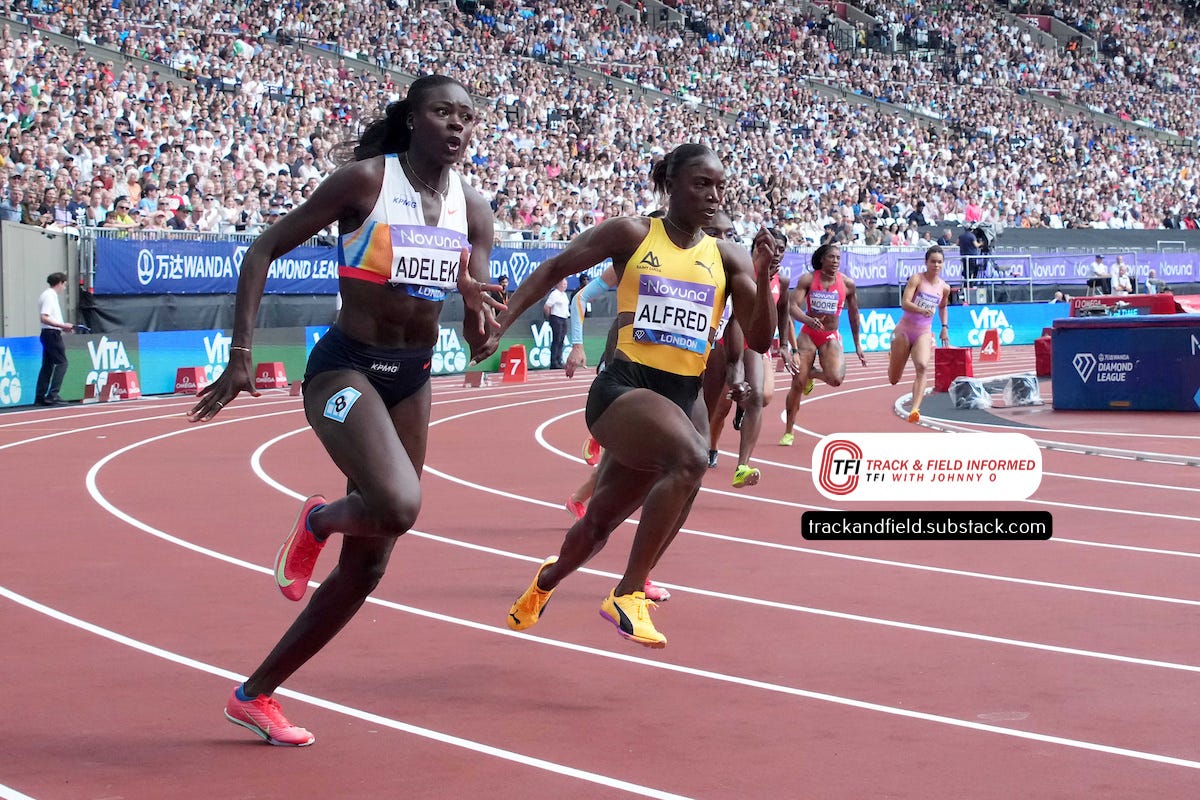
A lot can happen between now and the start of the World Athletics Championships in Tokyo on Sept. 13, but at this juncture of the season, Julien Alfred of St. Lucia is my pick to win both the women’s 100 and 200 meters in that meet.
I am aware that Melissa Jefferson-Wooden of the U.S. is unbeaten in four 100-meter finals this season and defeated Alfred when she ran 10.75 seconds to Alfred’s 10.77 in the Prefontaine Classic on July 5. And I realize that Gabby Thomas of the U.S. is the defending Olympic champion in the 200 who turned back Alfred by a solid margin when she won the gold medal in Paris last summer.
I also know that Shericka Jackson of Jamaica ran 21.45 and 21.41, the third- and second-fastest times in history, in winning World Athletics Championships titles in 2022 and ‘23. But an injury forced her to withdraw from the Olympics and the 31-year-old sprinter has raced sparingly this year while posting bests of 10.88 in the 100 and 22.53 in the 200.
In contrast, the 24-year-old Alfred has run 10.75 in the 100 and 21.71 in the 200 during a season in which she has appeared to be stronger than ever.
That strength was fully evident in the Novuna London Athletics Meet in London last Saturday when defending Olympic 100 champion Alfred ran a yearly world-leading time of 21.71 in the 200 while dominating a field that included the British duo of Dina Asher-Smith and Amy Hunt, who finished second and third, respectively, with times of 22.25 and 22.31.
Alfred’s effort, that was run in front of a capacity crowd of more than 60,000 in London’s Olympic Stadium, bettered her previous national record of 21.86 from last year and moved her into a three-way tie for ninth on the all-time performer list. It also gave her nine victories in 10 races this season, with her first three wins coming in 300- or 400-meter events.
Racing in — and training for — those longer sprints has helped give her a level of speed endurance that she has never had before and it could be seen in the 200 on Saturday when she ran a better turn than anyone else in the field and then roared down the home straightaway before easing up ever so slightly in the final two strides of the race.
Alfred’s dominance was evident in splits on the meet website as she led 2019 World champion Asher-Smith by five hundredths of a second after clocking 11.15 for the first 100 meters of the race before leading second-place Hunt by two tenths of a second after 150 meters. She then finished more than half a second in front of runner-up Asher-Smith, who had overtaken Hunt in the last 50 meters of the contest.
“It was a strong first 150 metres of the race, and I managed to control it to finish strongly,” Alfred said in quotes on the meet website. “It was a great race for me, and races like this give me a lot of confidence as we get closer to Tokyo. I did the 200m last year before the Olympics and I finished second, but seeing how I ran today and how comfortable I felt, I am a lot more confident in my 200m heading into the worlds.”
Thomas had to come from behind to defeat Alfred, 21.82 to 21.86, in London last year. But the rematch in the Olympic Games was not close as Thomas’ 21.83 clocking left her well clear of a tired-looking Alfred, who placed second in 22.08.
It’s my guess that she and her coach, Edrick Floreal of the University of Texas, learned much from that experience and it led to her racing a 300 — in 36.16 seconds — and a 400 — in 52.97 — indoors in February before she clocked 36.05 in an outdoor 300 in the Miramar Invitational in Miramar, Florida, on April 5, while finishing eight hundredths of a second in front of Jackson.
In her seven races since then, Alfred has timed 10.89, 10.75, 10.77, and 10.79 in the 100, and 21.88, 22.15, and 21.71 in the 200.
“Overall, I’m good, I’m healthy,” Alfred said in an Athletes Lounge interview on flotrack.org last Saturday.
She added that she was happy because she had successfully implemented the race plan devised for her by Floreal.
“I did what he asked of me and that’s all that matters right now.”
Add sprint double: If Julien Alfred of St. Lucia, or any other sprinter for that matter, is able to win both the women’s 100 and 200 meters in Tokyo, it would mark the first time since 2013 that a woman had won both of those races in the same World championships.
Shelly-Ann Fraser-Pryce of Jamaica won the 100 in 10.71 seconds and the 200 in 22.17 in the 2013 World championships in Moscow. And the sprinter affectionately known as the Pocket Rocket went on to win her third, fourth, and fifth World titles in the 100 in 2015, ’19, and ’22.
She won her first World title in the 100 in the 2009 championships in Berlin.
That had come a year after she had won the first of two consecutive Olympic titles in the event in the Games in Beijing.
Who needs a pacesetter?: Gudaf Tsegay of Ethiopia ran the second-fastest time in history in the women’s mile when she set a meet record of 4:11.88 in the event in London.
Catriona Bisset of Australia had reportedly been scheduled to set the pace for the first part of the race, but the 28-year-old Tsegay was in the lead when she passed through 200 meters in 29.4 seconds and she never trailed again.
Birke Haylom of Ethiopia was not far behind Tsegay when her older compatriot went through 400 meters in 59.93 and 800 in 2:03.45, but she began to fall back shortly after that and eventually finished 10th in 4:19.74.
Olympic 1,500 silver medalist Jessica Hull of Australia was nearly two seconds behind Tsegay when she went through 800 meters, but she had reduced her deficit to four tenths of the second when the Ethiopian clocked 3:07.98 at 1,200 meters.
That gap remained the same for the next half lap around the track, but Tsegay began to draw away from Hull around the final curve and that expansion continued in the home straightaway as the Australian finished second in 4:13.68.
Sarah Healey of Ireland placed third in 4:16.26, with Sinclaire Johnson of the U.S. fourth in 4:16.32 and Marta Zenoni of Italy fifth in 4:17.16.
Tsegay’s time bettered the Ethiopian record of 4:13.31 set by Genzebe Dibaba in an indoor meet in 2016 and was it second on the all-time list to the 4:07.64 world record that was set by Kenyan Faith Kipyegon in 2023.
Hull moved to sixth on the all-time performer list with her Oceania record, while Healey and Johnson are now 13th and 14th, respectively, with Johnson’s time being a North and Central American best.
Zenoni’s mark was an Italian record as the top nine finishers set personal bests.
Tsegay’s performance came two weeks after she had run 14:04.41 to finish third in the women’s 5,000 meters in the Prefontaine Classic in Eugene, Oregon, in a race in which Kenyan Beatrice Chebet lowered the world record to 13:58.06.
“It was not easy but to get a meeting record, national record and personal best makes me so happy,” Tsegay said in quotes on the meet website. “The indoors did not go well for me then I had a small injury so this outdoor season has been hard for me but I come back even stronger. I have less speed after the injury so it was always going to be hard but I took it out at the bell. I have done a lot of speedwork to build strength after my injury.”
Eight for nine: Mykolas Alekna of Lithuania produced his record-tying sixth 70-meter (229 feet 8 inches) meet of the season in the men’s discus when he set a Diamond League record of 71.70 (235-3) in winning the event in London.
The 22-year-old thrower, who earned an undergraduate degree in psychology from Cal in May, had been upset in the NCAA championships in mid-June, but that has been his only loss in nine meets this season.
After registering marks of 66.97 (219-8) in the first round and 67.27 (220-8) in the second on Saturday, Alekna unleashed his 71.70 (235-3) throw in the third. He then fouled on his fourth and fifth attempts before throwing 68.37 (224-3) on his sixth.
Kristjan Ceh of Slovenia, the 2022 World champion, finished second at 68.83 (225-10). He was followed by Lawrence Okoye of Great Britain at 67.24 (220-7), 2021 Olympic champion Daniel Stahl of Sweden at 66.62 (218-7), and reigning Olympic champion Roje Stona of Jamaica at 64.71 (212-3).
Alekna, who raised the world record to 75.56 (247-10) in a meet in Ramona, Oklahoma, in April, is now tied with Gerd Kanter of Estonia for the most 70-meter meets in one season.
Kanter threw 70 meters or farther in six of his 26 meets in 2007, the year he won the World title in Osaka, Japan.
“It is my biggest throw ever in this stadium,” Alekna said in quotes on the meet website. “People have been saying I only throw big outside of stadiums, but now I have thrown big inside one.
“I was a little bit nervous because this is my first big meet of the year in front of a huge crowd, so I really enjoyed it. It took me until the third round to feel comfortable, but I think the support really pushed us all on, so by that third round, it all came together and that is when the big throw came.”
Superb streak continues: Phanuel Koech of Kenya, who finished fifth in the men’s 800 meters in last year’s World Athletics U20 Championships, defeated another high-caliber field in the 1,500 when he set a meet record of 3:28.82 in London.
The 18-year-old Koech surged into the lead heading into the final curve of the race and then kept Olympic silver medalist Josh Kerr of Great Britain at bay in the home straightaway as Kerr placed second in 3:29.37 in a race in which George Mills of Great Britain, 19-year-old Cam Myers of Australia and Robert Farken of Germany had all crashed to the track with a little more than half a lap to go after Mills, who was in third-place at the time, appeared to have been inadvertently tripped from behind by Myers.
Kerr, the 2023 World champion, had begun the race intent on bettering his British record of 3:27.79 that he had set in finishing second to Cole Hocker of the U.S. in the Olympic final. But British 5,000-meter record-holder Mills ran ahead of Kerr for much of the race as he was in third place behind pacesetters Ben Claridge and Zan Rudolf when Claridge clocked 55.47 at 400 meters and 1:51.46 at 800.
Rudolf took the lead down the backstretch after Claridge dropped out, but Mills was in the lead when he came through 1,000 meters and when he clocked 2:48.43 at the of three laps.
Kerr moved past Mills shortly after that, but he was soon passed by Koech, who made his move while running on the inside of lane one after Mills had left that space open. Isaac Nader of Portugal and 2022 World champion Jake Wightman of Great Britain were not far off behind at that point, but they fell back after having to avoid the collective fall of Mills, Myers, and Farken.
After running the backstretch 100 in 13.4, Koech clocked 13.3 for the turn 100 before following that with a final split of 13.4 compared to Kerr’s 13.7.
Koech’s 3:28.82 clocking came after he had run 3:29.05 to win the Golden Spike meet in Ostrava, Czechia, on June 24 and 3:27.72 to place second in the Meeting de Paris contest four days earlier. He had a personal best of 3:32.26 prior to those races.
“I thank God for this day, I was not expecting to run like that today,” Koech said in quotes on the meet website. “The field was very strong, and I enjoyed racing against them all today. I was thinking about all the big guys running fast, so I had to stay focused. Tactics did not go to plan, I just had to go with 200m to go.”
Superb streak continues II: Emmanuel Wanyonyi of Kenya posted his fourth consecutive Diamond League victory of the season in the men’s 800 meters in London when he came from behind to defeat Marco Arop of Canada with a meet-record time of 1:42.00.
The 20-year-old Wanyonyi had been in second place when pacesetter Patryk Sieradzki led the field through the first lap in 49.21 seconds and he had moved into first after Sieradzki dropped out shortly after completing the first 500 meters of the race. However, Olympic silver medalist Arop surged past Olympic champion Wanyonyi shortly before he went through 600 meters in 1:15.83.
The Canadian looked to be full of run as he entered the home straightaway, but Wanyoni began to make up ground on Arop with about 70 meters to go and he moved past him with roughly 30 meters left in the race as Arop had left the inside of lane one open.
Arop’s time of 1:42.22 was a season best and the fourth fastest of his career, and it left him ahead of third-place Max Burgin of Great Britain, who ran 1:42.36.
He was followed by Bryce Hoppel of the U.S. in 1:42.71, Mohamed Attaoui of Spain in 1:43.01, and 2019 World champion Donavan Brazier of the U.S. in 1:43.08.
“I am so excited to win this race, that is what I came here to do, and it is great to set a meeting record too,” Wanyonyi said in quotes on the meet website. “It was a great race to be a part of. Preparation has been going well after Monaco, so this one was important today. My training right now is at 80%, so I will be upping the training in the next few weeks and over the next races before Tokyo.”
Tokyo will be the site of the World Athletics Championships from Sept. 13-21.
Excelling over two laps: Georgia Hunter Bell of Great Britain, the Olympic bronze medalist in the women’s 1,500, looked terrific in winning the 800 in London on Saturday after moving from third place to first in the home straightaway.
The 31-year-old Hunter Bell’s time of 1:56.74 was the second fastest in the world this year, as well as the second fastest of her career, and it left her well clear of second-place Addy Wiley of the U.S., who ran 1:57.43, and third-place Halimah Nakaayi of Uganda, who clocked 1:57.62.
It also followed a victory in the BAUHAUS-Galan Diamond League meet in Stockholm in mid-June when she had run 1:57.66.
Hunter Bell was in sixth place after the first 300 meters of the race on Saturday and she had moved up to fifth when pacesetter Lisanne de Witte led the field through the first lap in 56.49 seconds.
De Witte was still in first place at the start of the backstretch, but Jemma Reekie of Great Britain assumed the lead after she dropped out and she was leading Nakaayi, Hunter Bell, Shafiqua Maloney of St. Vincent and the Grenadines, and Wiley — in that order — when she came through 600 meters in 1:26.66.
Nakaayi had passed Reekie entering the final straightaway, but third-place Hunter Bell moved to her right shortly after that and sped past Reekie first, and then overtook Nakaayi with about 60 meters to go and was never seriously challenged after that, despite Wiley making a late move from fifth place to second.
“The race went as I thought it would,” Hunter Bell said in quotes on the meet website. “I thought I would probably be around fourth or fifth at the bell and then aim to work my way through the field. The longer the race goes on the more I am aware of those who can hold that 400 and 200 speed. So much of the 800 is about positioning so you have to be aware of what is going on around you all the time.”
She then added that she felt amazing in the last 100 meters “so I really wanted to push to the finish line.”
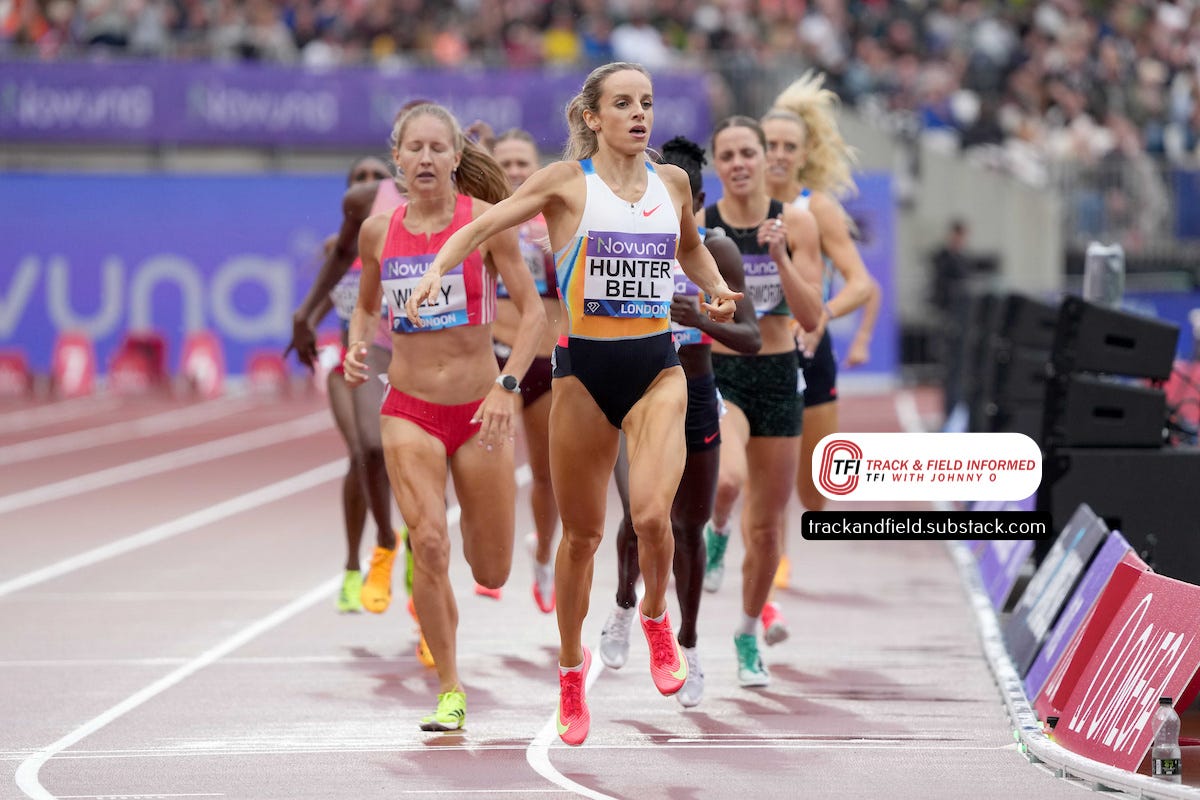
Runaway victory: Oblique Seville of Jamaica, the only man to have advanced to the finals of the 100-meter dash in the last three global title meets, dominated a high-quality field in winning the event in 9.86 seconds in London.
Seville, who had placed fourth in the 2022 and ’23 World championships and eighth in the Olympic Games last year, finished well ahead of defending World and Olympic champion Noah Lyles of the U.S., who placed second in 10.00.
Lyles was followed by Zharnel Hughes of Great Britain in 10.02, Akeem Blake of Jamaica in 10.08, and the formerly undefeated Akani Simbine of South Africa in 10.11. World indoor 60-meter champion Jeremiah Azu of Great Britain also ran 10.11 while finishing in sixth place and Olympic 200 champion Letsile Tebogo of Botswana was seventh in 10.12.
The 24-year-old Seville had finished second to Olympic silver medalist Kishane Thompson in the Jamaican championships on June 27, but he had one of the better starts in the field last Saturday and he had taken charge of the race at the 40-meter mark as his 4.62-second clocking at that point in the contest put him seven hundredths of a second ahead of second-place Blake. He then expanded his lead to .12 seconds over second-place Lyles at 70 meters and he had added two hundredths of a second to that cushion when he crossed the finish line.
“I am proud of how I ran amongst a stacked field, and to win,” Seville said in quotes on the meet website. “I was the only one to run under 10 seconds today, it is something special and phenomenal heading into a major championship later this year. Everything I have been practicing in training, I delivered out there today.”
Tremendous finish: Charlie Dobson of Great Britain won the men’s 400 meters in a personal best of 44.14 seconds in London after moving from sixth place to first in the final 50 meters of the race.
Dobson, the runner-up in last year’s European Athletics Championships, turned back a field that included Olympic silver medalist Matthew Hudson-Smith of Great Britain in 44.27, yearly world leader Zakithi Nene of South Africa in 44.29, and Vernon Norwood of the U.S. in 44.34.
The time by the 25-year-old Dobson strengthened his hold on second on the all-time British performer list and bettered his previous best of 44.23 that he had run while finishing fourth in the Diamond League meet in London last year.
Dobson was in seventh place after the first 250 meters of the race last Saturday before moving up to sixth at the 300 mark. He was still in that position when he was credited with a 350-meter split that left him three tenths of second behind leader Norwood.
However, he began to make up ground on those in front of him a short time later and he eventually passed first-place Hudson-Smith with less than 10 meters left in the race.
According to splits on the meet website, Dobson covered his final 100 meters in 11.80 seconds and his last 50 in 6.10. In contrast, Hudson-Smith ran 12.36 and 6.50, respectively, for those segments of the race.
“It is an incredible feeling, I love running here in front of a massive home crowd, it is just awesome to get that time,” Dobson said in quotes on the meet website. “I tried to do a slightly different race than what I normally do, so I got out hard to 200m and then I just tried to hold on and I hope I did that. I will need to look at the splits later, but it felt well paced. Tactically it went perfectly, and I won the race, so what more can I ask for.”
Unusual double: Niels Laros of the Netherlands won the men’s 5,000 and 800 meters in the European Athletics U23 Championships in Bergen, Norway, last week.
Competing in his first meet since he came from well back to win the Bowerman mile in 3:45.94 in the Prefontaine Classic in Eugene, Oregon, on July 5, Laros ran 13:44.74 in the 5,000 on Saturday before clocking 1:44.36 in the final of the 800 on Sunday in the meet that was held at Fana Stadion.
Two days before that, the 20-year-old Laros had lowered his personal best to 1:44.19 in the 800 while finishing third in a qualifying heat behind Francisco Pernici of Italy, who ran 1:44.06, and Henry Jonas of Great Britain, who clocked 1:44.10.
Pernici finished fourth in the final in 1:45.01 and Jonas was fifth in 1:45.17 in a race in which Justin Davies of Great Britain placed second in 1:44.97 and Giovanni Lazzaro of Italy took third in 1:44.98.
Laros began a two-paragraph post on Instagram with the following text: (3x) double european champion 🥇🥇 (u23 category this time). A unique double, really happy to come away with two golds over 800m and 5000m 🙏🏻. Taking the experiences with me to the next tournaments.
Long time coming: Saga Vanninen of Finland topped her personal best by more than 150 points while winning the heptathlon with a score of 6,563 points in the European U23 championships on Sunday.
The 22-year-old Vanninen bettered her previous best of 6,391 points with an effort that topped the national record of 6,404 that had been set by Satu Ruotsalainen when she finished fourth in the 1991 World championships in Tokyo.
Abigail Pawlett of Great Britain finished second with 6,320 points on Sunday and she was followed by Serina Riedel of Germany with 6,183.
Vanninen, who won the pentathlon in the World indoor championships in March, totaled 3,870 points in the first four events on Saturday while taking a three-point lead over second-place Pawlett and a 218-point lead over third-place Maena Bastien of France.
Vanninen opened the competition by running 13.25 seconds in the 100-meter hurdles and she followed that with marks of 1.80 (5-10¾) in the high jump, 15.09 (49-6¼) in the shot put, and 22.45 in the 200.
She pushed her lead to 92 points over Pawlett in the first event on Sunday when she spanned 6.49 (21-3½) in the long jump and she extended her advantage to 151 when she threw the javelin 43.74 (143-6). She then capped her national record by running 2:11.00 in the 800 meters.
Briefs: Femke Bol of the Netherlands won her 24th consecutive Diamond League race in the women’s 400-meter hurdles when she clocked 52.10 seconds in the Novuna London Athletics Meet in London last Saturday. Bol’s time was her second fastest of the season and left her well ahead of Olympic fourth-place finisher Jasmine Jones of the U.S., who placed second in 53.18. . . . . . . Chase Jackson of the U.S. posted her eighth victory in the last nine meets when she put the shot 20.27 meters (66 feet 6 inches) in the Meeting Madrid 2025 meet in Madrid, Spain, on Saturday. The two-time defending World champion produced her top mark in the fifth round and she also had puts of 20.26 (66-5¾) on her fourth attempt and 20.07 (65-10¼) on her second. . . . . . . Elian Larregina of Argentina set his second national record of the year in the men’s 400 meters when he won the event in 44.53 in the Meeting Madrid 2025 meet. That mark bettered the 44.67 clocking that he had run in winning a race in Troyes, France, on June 22.
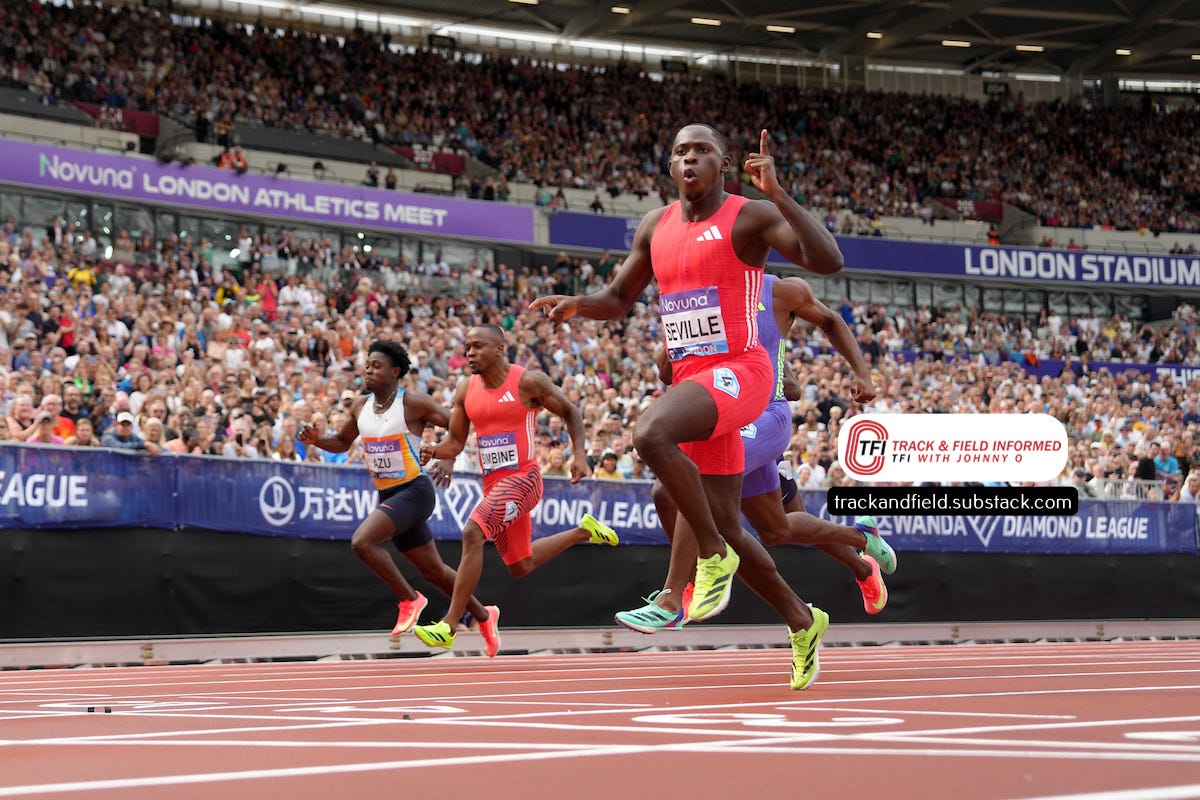
On the performance enhancing drug front: Ruth Chepngetich of Kenya, the world record holder in the women’s marathon, has been provisionally suspended by the Athletics Integrity Unit (AIU) for testing positive for Hydrochlorothiazide (HCTZ) related to a sample collected from her on March 14 of this year.
HCTZ is a diuretic and classified as a prohibitive substance by the World Athletics Doping Agency (WADA) due to its ability to mask the presence of banned performance enhancing drugs.
In a July 17 press release, the AIU announced that the sample collected from Chepngetich on March 14 of this year had an estimated concentration of 3,800 mg/ml in her urine.
According to a runnersworld.com post on July 17 the “minimum reporting concentration is 20 mg/ml”, meaning that the measured level in her sample was 190 times the allowed limit.
Chepngetich had lowered the world record in the women’s marathon to a stunning 2:09:56 in winning the Chicago Marathon last October.
Her time had crushed the previous world record of 2:11:53 set by Tgist Assefa of Ethiopia in the 2023 Berlin Marathon and bettered her previous personal best of 2:14:18 that she had set in winning the women’s division of the 2022 Chicago Marathon.
In her only race since setting the world record, Chepngetich clocked 1:06:20 to finish second in the Lisbon Half Marathon in Portugal on March 9 of this year. Tsigie Gebreselama of Ethiopia won that race in 1:04:21.
Chepngetich was scheduled to run in the London Marathon on April 27 of this year, but she had withdrawn from that race and said in a bbc.com post that “I’m not in the right place mentally or physically to race my best in London and I am therefore withdrawing.”
According to the AIU release, Chepnegetich had “been notified and interviewed in person” by an AIU representative in Kenya on April 16 and that she “complied with requests regarding our investigation.”
On a personal note: I will be taking some time off between now and the start of the USA Track & Field Outdoor Championships in Eugene, Oregon, on July 31.
Therefore, I expect my next post to be a daily report about the first day of the USATF championships.


